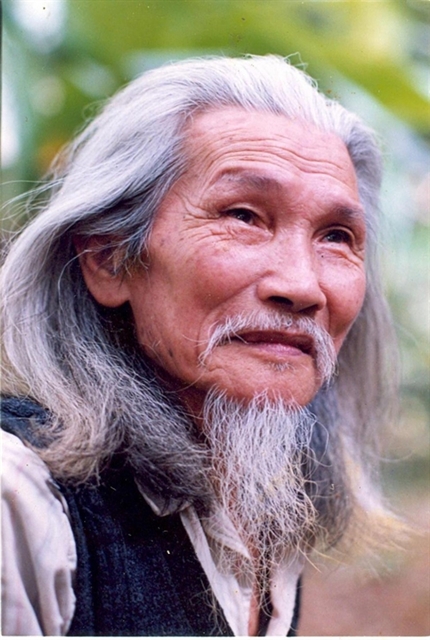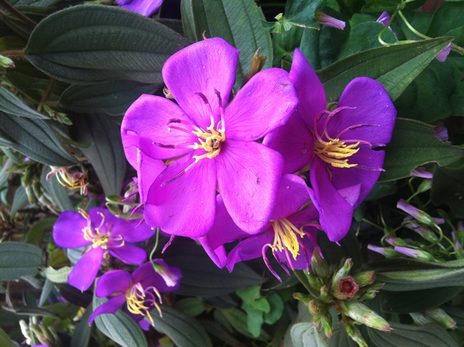Màu Tím Hoa Sim (The colour of myrtle flowers) is considered one of the most touching poems composed by poet Hữu Loan (1916-2010).
It is a lament dedicated to Loan’s first wife Lê Đỗ Thị Ninh, who drowned in her homeland of Thanh Hóa Province in 1949.

Poet Hữu Loan (1916-2010).
Hearing the news on his way marching to battle, Loan wrote the poem that still touches millions of Vietnamese people today.
The poem features a sorrowful love during the war between a beautiful woman and a soldier. They fell in love and got married. Right after the wedding, they parted ways and the soldier marched to battle. He is worried about her future if he dies in the war. But when he returns home safe, he learns that his wife has died.
In his nostalgia, he remembers old memories, with the gentle figure of the young wife as he passes hills with violet myrtle flowers, which his wife loved when she was alive.
Poet Hữu Loan, born as Nguyễn Hữu Loan in 1916 in Vân Hoàn Village, Nga Lĩnh Commune, Nga Sơn District in the central province of Thanh Hóa.
He graduated from high school in 1943 and worked as a teacher. He joined the Việt Nam League for Independence (Việt Minh) in Thanh Hóa.
Before 1945, he was a freelance writer for Văn Học (Literature) magazine published in Hà Nội.
After the August 1945 Revolution, he worked as a member of the Administrative Committee of Thanh Hóa Province in charge of education, information, commerce and industry.
During the war of resistance against the French, he joined the Việt Nam People's Army, and wrote poem Màu Tím Hoa Sim in 1949.
His first poem titled Đèo Cả (Cả Pass) was among the most popular poems during the anti-French war.
Màu Tím Hoa Sim was among the first poems to have its copyright in Việt Nam bought by VTB Vietronics Tân Bình Company in HCM City. The company paid him VNĐ100 million (US$6,400) in 2004.
Though the poet lived in the north, the poem was popular among poetry lovers in the south even before the country's reunification in 1975.
The poem was only printed in newspapers, books but also turned into songs to be broadcast on radio and live shows on stages, especially in the 1960s.

Myrtle flowers. Photo zicxa.com
The following is the poem translated by veteran translator Dương Tường:
The colour of myrtle flowers
Her three elder brothers were in the people’s army
the youngest of her siblings still a babbling urchin
when her hair was at its greenest
A soldier away from home I loved her
with that love one devotes to one’s younger sister
The wedding day she did not claim for a bridal robe
I came straight back from camp
my soldier’s boots coated with dust from marches
She smiled nicely beside her original man
I rejoined my regiment right after the wedding
From the battled area I pitifully thought of her
To get married in war-time
if I’d never be back… it pained me
picturing up my young wife
desperately awaiting at home
each sun-setting
Yet it was not the warring man but
his beloved in the rear that got killed
I got back
too late to see her alive
Her mother seated herself by her daughter’s tomb
wrapped in darkness
The vase for flowers on the wedding day
now served as incense urn
with cold ashes all around
Dearest
your hair was still too short
to be knotted into a full chignon
Dearest
the last moment
we’re not given the mere chance
to cross eyes once nor to exchange one word
dearest…
The early autumn wind rippled the shivering surface of the river
The little one growing up
gazed at his sister’s photo-portrait, bewildered,
when the early autumn wind rose
withering up the grass about the tombstone
In a forest doused with rain one afternoon
the three soldiers on the northeastern front heard of
their sister’s death before news of her wedding reached them
In days not long ago
she loved violet myrtle flowers
she wore violet blouses the colour of myrtle flowers
In days not long ago…
The sun was setting and we kept marching
through hills upon hills of myrtles
unending hills covered with those violet myrtle blossoms
which dyed the sylvan dusk in an infinite violet
Somewhere someone sang out:
“My shirt came unsewn at one side
"I’ve taken no wife and my mum is too old to mend it yet”[1]
Glancing at my shirt torn at the shoulder
bathed in the colour of the blossoms I echoed in petto:
“My shirt came unsewn at one side
"I’m away from mum and orphaned of wife.”
Source: VNS
[1] from a Vietnamese folk song.
VNQD